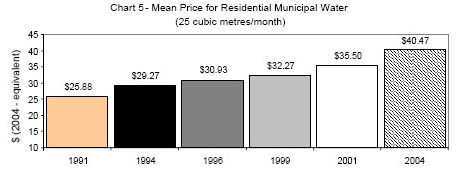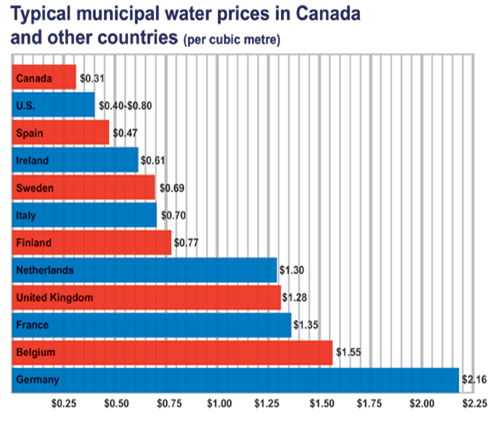Water Pricing
Many water suppliers in BC need to increase the price charged for water. This web page gives you a link to further support and provides an introduction to water pricing for community water suppliers in British Columbia.
Further Support
If you need support in effective water pricing, visit the web site of an Industry Partner with considerable experience in this area.
Effective Water Pricing
Introduction to Water Pricing
Historically water prices in British Columbia have been significantly lower than in many other parts of Canada. And in turn Canada has some of the lowest water prices in the world. While this may offer short-term benefits to consumers it has serious long-term consequences. Water supply systems have typically not set aside enough money for upgrading their infrastructure. Pipes, pumps, reservoirs and other components of water systems all deteriorate with age. Unless these components are systematically maintained and replaced when appropriate, then the infrastructure will not be sustainable and serious failures can occur. These problems exist in both large municipalities and in small community water supply systems.
How much should you charge for water?
The answer to this question can be complicated. Clearly you need to recover the costs of operating your water supply system. These costs may include for items such as power consumption, wages, chemicals, insurance, administration and maintenance. You should also set aside money which is then accumulated in a reserve fund to pay for infrastructure upgrades and renewals in the future. You earn revenues in the form of charges made to customers, and perhaps from other sources. The money you earn from charges to customers depends in part on the price you charge for water. As noted, many water suppliers have historically undercharged, and they need to urgently review their water pricing. Follow this link to find out more about resources available: Water Pricing Resources
Water Rates for Comparison
For comparison, the 2010 water rate in the Capital Regional District (CRD) for the West Shore communities is about $1.50 per cubic meter. An average household consuming 25 cubic meters per month will therefore pay $37.50 per month for water. The CRD water system is much larger than many community water systems in BC, and can therefore achieve considerable economies of scale. This means that smaller community water systems must typically expect to charge more than the CRD in order to maintain sustainable finances. Charges of up to $55.00 per month per connection, or more, may be seen in certain community water systems.
Historical Price Increases for Water
A web site operated by Environment Canada notes that there have been steady increases in the price charged for water. Information about water rates collected in a 2004 survey was used to calculate water prices for standard volumes of monthly usage, with the following results(Note: Water prices are now (2011) higher than those shown below
As with previous surveys, these price calculations were done for 10, 25, and 35 cubic metres per month. Ten cubic metres is the lower range of monthly water use, while 25 cubic metres is an average family’s monthly consumption. Thirty-five cubic metres represents high family water use.
Since 1991, the national average price 10 for residential municipal water and wastewater service for a monthly consumption of 25 cubic metreshas increased from $25.88 in 1991 to $30.93 in 1996 to $35.50 in 2001 and up to $40.47 in 2004--an increase of 56% since 1991. Although real prices increased steadily between 1991 and 2004, in general water prices in Canada continue to remain low compared to the actual cost of providing these services

Comparative Water Prices: Data from 1999
Source: World Commission on Water for the 21st Century, 1999
Note: The unit prices shown below are much lower than the actual unit prices in 2011. Data is shown for comparative purposes only.
